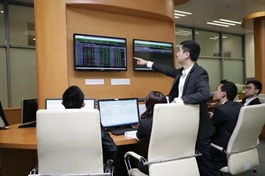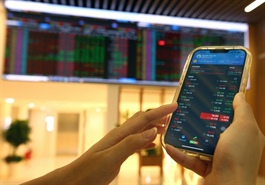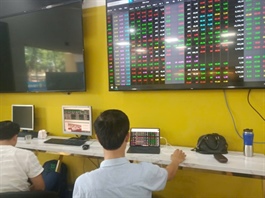Financial market enters a new cycle of asset realignment
Financial market enters a new cycle of asset realignment
The stock market, now with capitalisation surpassing 100 per cent of GDP, is advancing steadily toward an upgrade from frontier to emerging status.
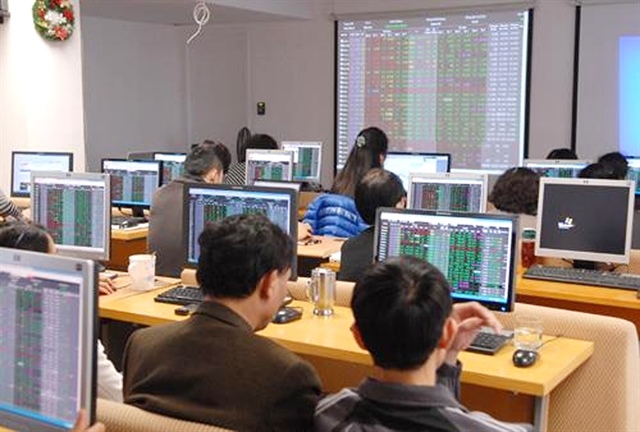
Investors at a trading room of a securities firm in Hà Nội. — Photo bnews.vn |
Việt Nam's financial market is undergoing a pronounced transformation as capital flows shift across major asset classes, from equities, bonds and real estate to emerging sectors such as digital assets, venture capital and alternative funds.
This dynamic trend was highlighted at the forum themed 'The Appeal of Asset Classes,' held under the framework of the third Vietnam Wealth Advisors Summit (VWAS 2025). Participants agreed that the financial market is entering a new phase marked by both challenges and opportunities.
As the final year of the 2021–2025 socio-economic plan nears its close, this is a pivotal moment for policymakers and investors to reflect on achievements and prepare strategies for the next five-year journey.
Phạm Văn Hoành, Editor-in-Chief of the Vietnam Investment Review, said that although the world economy continues to face prolonged inflation, geopolitical tensions and new tariff policies among major powers, Việt Nam has maintained macroeconomic stability and sustained impressive growth.
"In a world growing around 3 per cent, Việt Nam remains in a class of its own," he said, citing the country's nearly US$500 billion economy, stable politics, modern infrastructure, and deep institutional reform.
He added that four key Politburo resolutions — on innovation, global integration, institutional reform and private-sector development — have created a four-pillar institutional framework that strengthens investor confidence and builds a robust legal foundation for both domestic and international capital flows.
Experts at the forum noted that momentum in asset-class rotation remains strong.
The stock market, now with capitalisation surpassing 100 per cent of GDP, is steadily advancing toward an upgrade from frontier to emerging status, an achievement expected to attract tens of billions of dollars from global funds.
The bond market, after a sharp correction, is regaining stability and transparency as new legal frameworks take effect, reinforcing its role as a long-term capital channel for the economy.
Meanwhile, the real estate market is recovering on the back of land and credit policy reforms, coupled with surging demand for housing, urban infrastructure and industrial parks.
Alongside these traditional pillars, digital assets have emerged as a vibrant new frontier.
The tokenisation of real-world assets and the rise of fintech investment platforms are reshaping Việt Nam's financial landscape and signalling the country's readiness for a more digitalised future.
Addressing the forum, Vũ Việt Linh, vice president of Institutional Research at Maybank Investment Bank Vietnam, highlighted the importance of improving Việt Nam's sovereign credit rating as part of efforts to mobilise capital for industrialisation and modernisation.
"Việt Nam will need to mobilise around $250–280 billion per year between 2025 and 2030 to achieve GDP growth of 8–10 per cent," he said.
Achieving an investment-grade rating, possibly as early as 2028, would strengthen the nation's macroeconomic credibility, lower borrowing costs and attract greater foreign participation across markets.
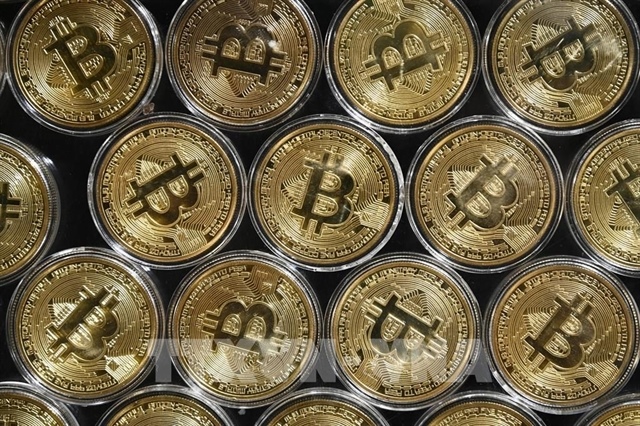
Investors at a trading room of a securities firm in Hà Nội. — Photo bnews.vn |
Unlocking blockchain's potential
Giáp Văn Đại, Founder and CEO of Nami Foundation, believes that blockchain is one of the foundational technologies driving digital transformation and economic model innovation.
The three goals of blockchain are to promote a more equitable, open and trustworthy economy. Transparency and fairness are not only outcomes but also essential means guiding this technology toward its objectives.
"Việt Nam is working to establish an international financial centre in Đà Nẵng and HCM City. The creation of this centre is a strategic move for Việt Nam to integrate more deeply into the global financial landscape," he said.
"This is not just about capital. It's also about technology and modern financial management capabilities. Fintech and blockchain companies can serve as the operational backbone for new financial instruments, especially digital assets, smart contracts and decentralised adaptive financial models (DAFi)."
He further noted that Việt Nam boasts a vibrant blockchain technology community, particularly in areas such as GameFi and the Metaverse, which have gained international recognition.
Nevertheless, the application of blockchain in traditional commerce, capital markets and labour sectors remains quite limited, despite the significant potential in these areas.
In capital markets, blockchain technology can increase transparency, facilitate asset tokenisation and enable swift, secure cross-border transactions.
Many major enterprises in banking, logistics and insurance have started implementing controlled testing processes, gradually forming blockchain application models that align with domestic legal conditions.
"For Việt Nam, this is a pivotal moment to break through. The government is actively refining the legal framework and supporting enterprises in harnessing the potential of new technologies," Đại added.
"However, a key factor is to enhance dialogue between regulatory bodies and businesses, listening to real-world experiences to adjust policies promptly. If we can achieve this, Việt Nam can fully integrate into global trends while building a safe, transparent and sustainable blockchain market, which will play a vital role in the country's digital transformation."
- 08:32 14/11/2025





